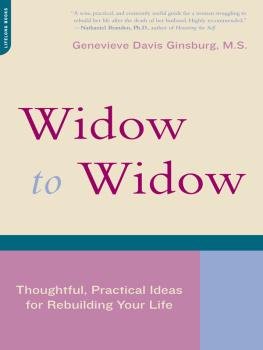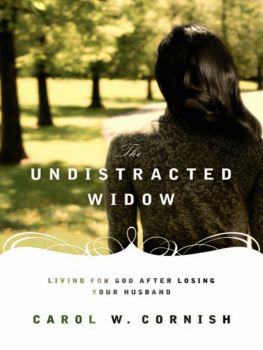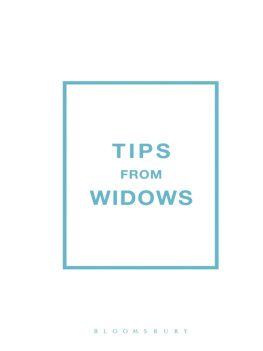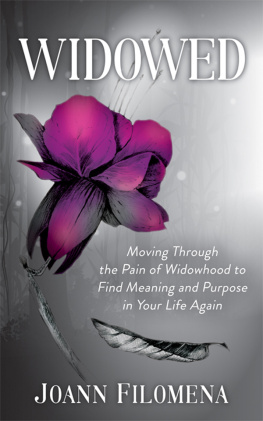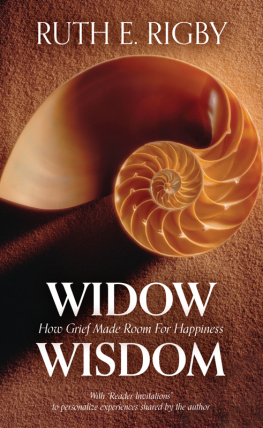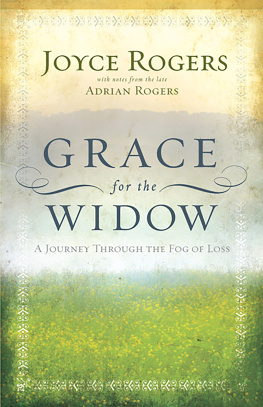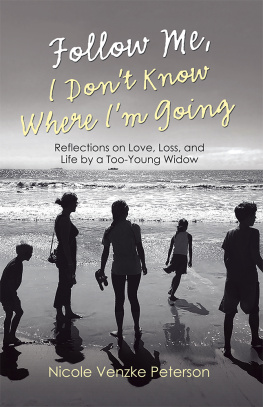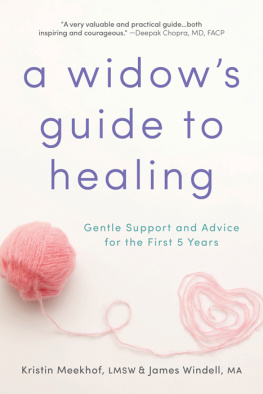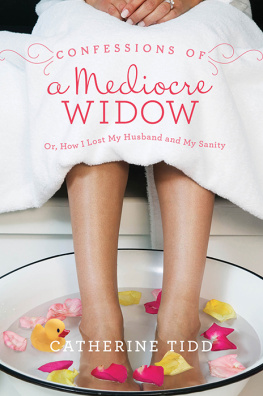THE PAGES THAT FOLLOW CLEARLY SHOW my indebtedness to all the widows who have shared with me their pain, their tears, their laughter, and their struggle. There would be no book without them. I am especially grateful to all those who tarried a while to lend a hand to others. For without them WIDOWED TO WIDOWED SERVICES never could have happened.
My deep appreciation also to all the wonderful women in Tucson, young and less young, single and coupled, for all their affectionate pats on the back and friendshipswhat every widow needs on her way up. I feel lucky to be part of a community where women, even though they insist on calling it networking, really help each other.
Preface
SOME YEARS AGO MY HUSBAND DIED while playing tennis. A classic situation, and I, the classic widow, bravely modeled myself in the Jackie Kennedy image, coping in public and appearing to go on with my life. A marriage counselor by profession, I knew all the problems and had all the solutions. And as a member of a group practice, I had the added advantage of the professional and personal support of my colleagues. I had a career, education, economic security and good friends. I was lucky, everyone told me. They told me I was still young (in my mid-50s), attractive and handling it admirably. I would make it.
My terrible secret was that I was a terrible fraud. As soon as I left the office each day and got behind the wheel of my car, I burst into tears of anger and pent-up grief. I would stop at a supermarket for food I did not need and did not eat, warding off for as long as possible the homecoming that screamed the absence of the words and love that had for so long been the fabric of my daily life. I felt I couldnt make a decision and then in desperation finally made a poor one. I felt madly compelled to become an expert in finances, plumbing, electricity and eating out alone in restaurants. I couldnt read, remember what people said or not smile in public. I was worried that I would get the flu and die for lack of chicken soup. I fantasized about the boy who sat next to me in the first grade, the boy I dated in high school, and a half dozen others whose last names I couldnt recall. Saturday nights were worse than other nights. Maintaining a cool exterior over the seething, insecure, incompetent person that I felt myself to be was a continuous struggle. No one knew. No one except, I was to discover, another widow.
With another widow I could cry a tear and laugh at some of my daily tragedies; we could admit to our craziness and be mutually reassured. Unlike my coupled friends and professional colleagues, another widow did not tell me how well I was doing and how well I looked. Both were devastating conversational openers: I wasnt, and if I did, I shouldnt.
Of course I got on with it. The tears lessened, the craziness abated somewhat, and I got better at getting on with it. Now I really knew some of the problems and realized that I did not have all the solutions. Although still outwardly the model of a coping widow and inwardly mushy, I thought I ought to share my authentic expertise by starting a support group for widows.
Envisioning a typical group of eight or ten, I placed notices through the media for a meeting of widows interested in forming a self-help group. In spite of a downpour that day, 83 women arrivedwomen from different backgrounds and experiences but with a clear single need: to give to and receive from each other. What was to emerge from this first meeting was not the self-perpetuating group, wherein group members would stay to lead a new group and I would go on with my life and counseling practice, but a full-scale organization, wide in scope, for widowed people of all ages and both sexes.
Instead, it was my counseling practice that paled. The problems couples brought to marriage-counseling sessions sounded petty and picayune by comparison to those of the widowed. When those couples spoke of being bored and doing something for myself I felt like telling them to stop being spiritless crybabies, to work, endure and struggle; that the best was yet to come; and that a good marriage was 90 percent boredom and 91 percent being there for each other. This formula would have been seconded by thousands of widows who looked back at boredom with envy, but the words, of course, were hardly acceptableor even helpfulto my paying clients.
My colleagues and friends shook their heads, mystified that I would find such a concentration of widows not only not depressing but also exhilarating, and a volunteer job more rewarding than one that paid 50 dollars an hour.
After a long sabbatical from which I have never officially returned, I changed my sign to read WIDOWED TO WIDOWED SERVICES and settled into directing the self-help organization as a full-time volunteer and a full-time learner. No job has given me greater pleasure, taught me more about courage, allowed me to observe such wisdom, or enriched me so with the warmth of humanity. Ive been at it since 1977, and I still do not know all the problems and solutions that I thought I knew as a marriage counselor.
I never planned to write a How-I-Did-It or a How-to-Do-It book. My own enthusiasm was for mutual-help groups, and thats where I preferred to put my energy. One day, though, I began to notice the startling number of times new participants to the support group asked the same theoretical question, Why didnt anyone ever tell me it would be like this? And while the answer was often nothing more specific than I know, I know, it was always magically reassuring.

